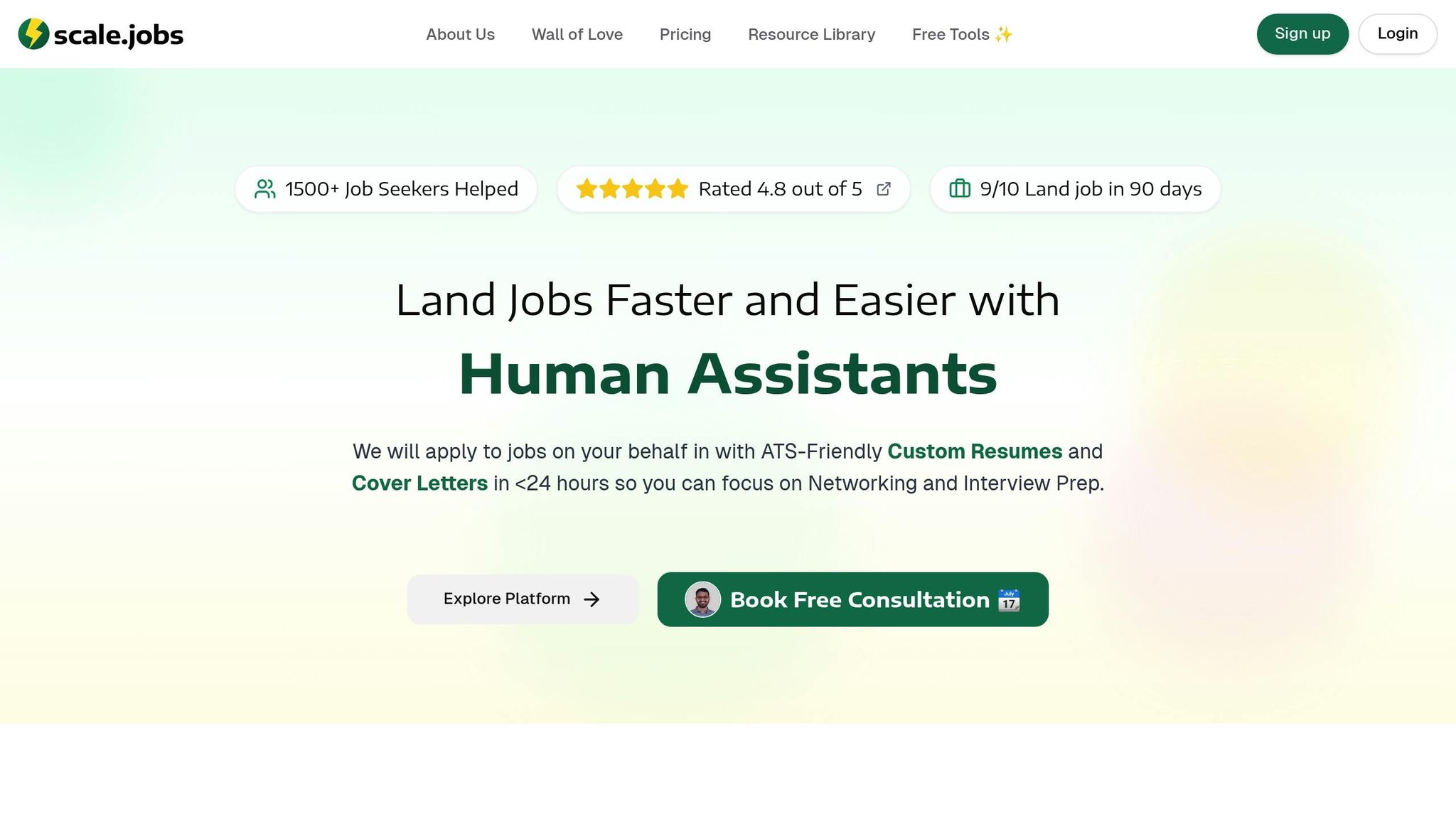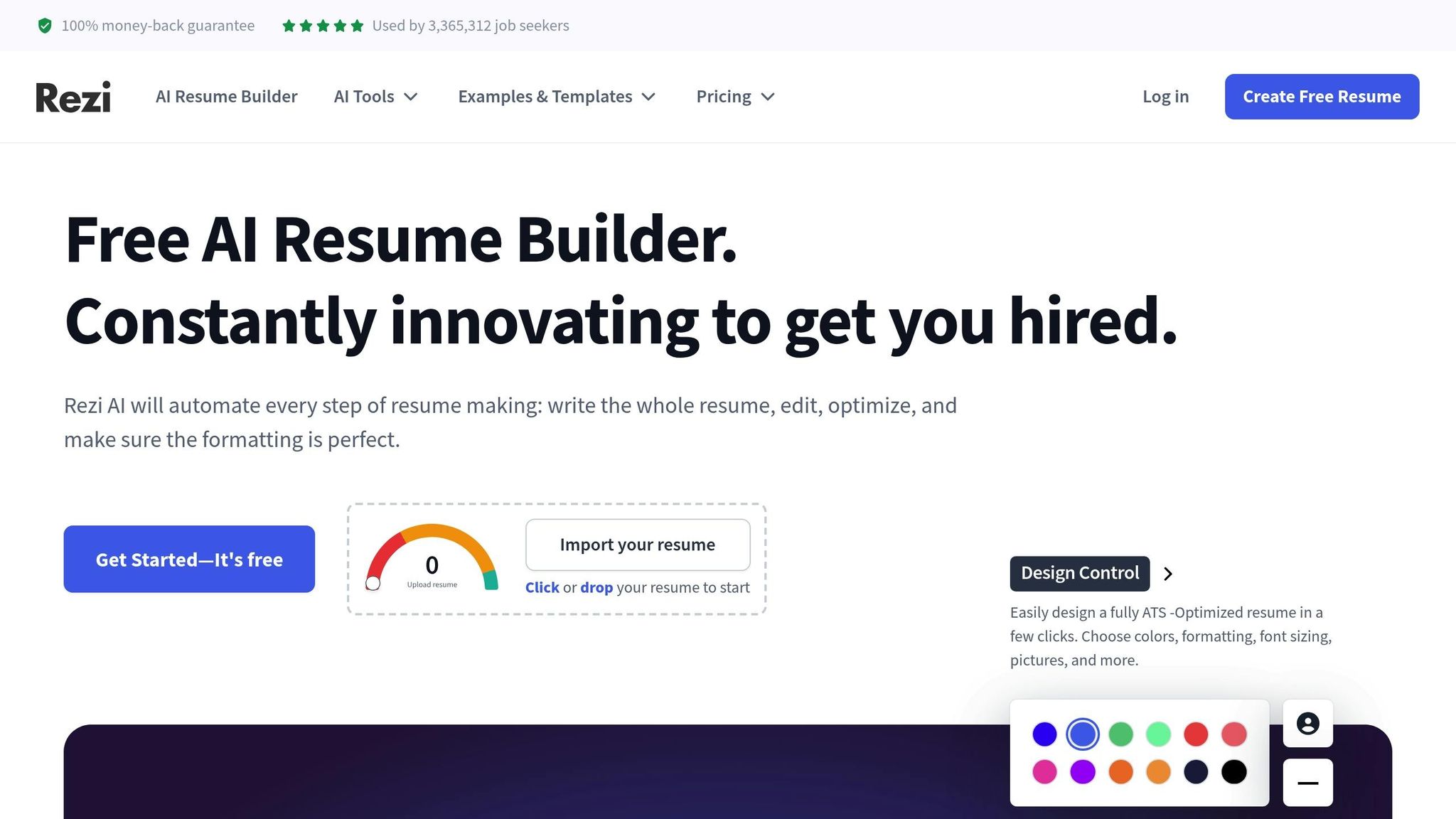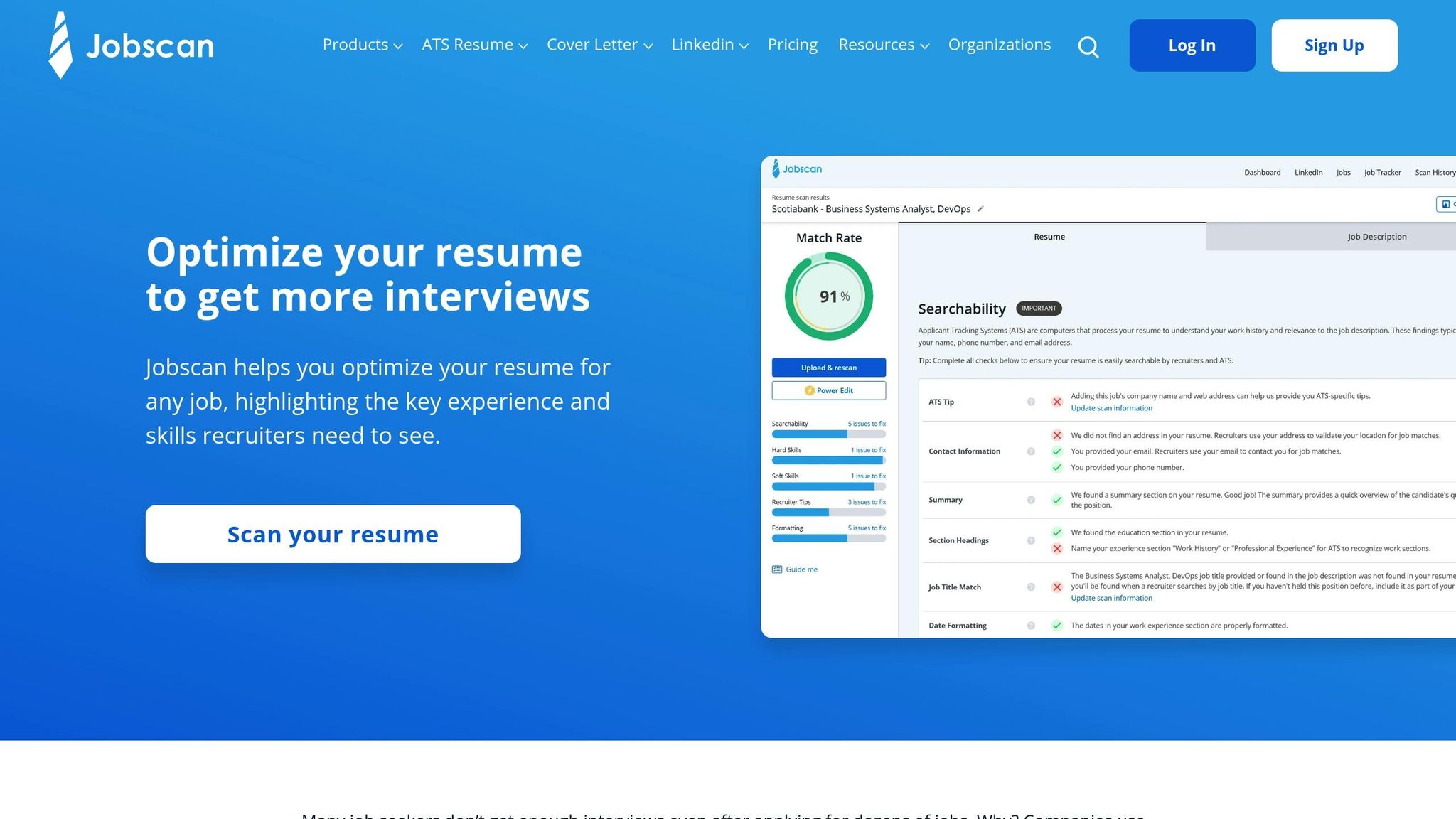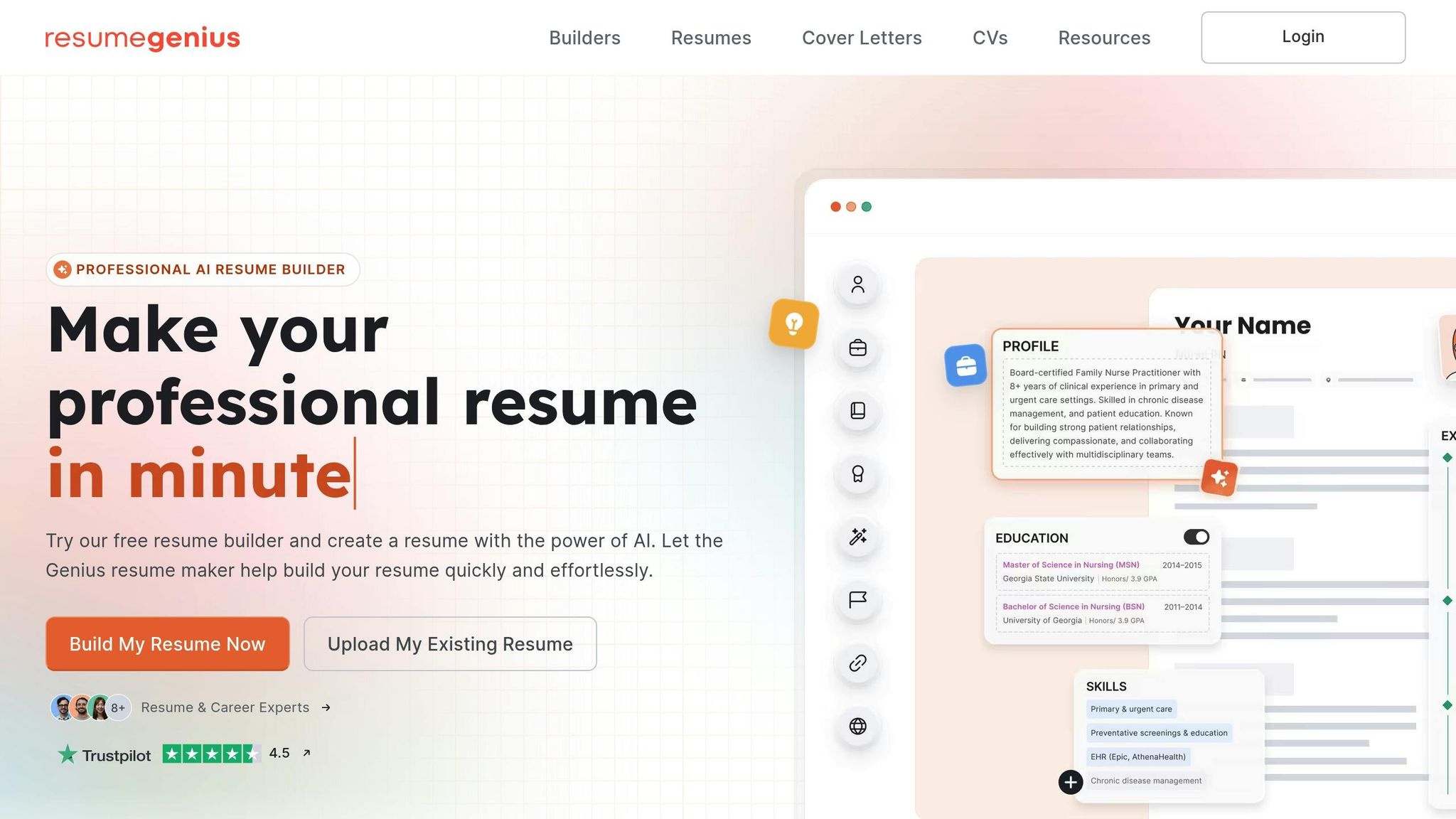Trained VAs vs AI Prompts: Accuracy & Care
scale.jobs
June 15, 2025
Looking for the best way to improve your job applications? Here's the quick answer: Trained Virtual Assistants (VAs) provide personalized, detailed support, while AI tools like Rezi.ai and Jobscan.co offer speed and scalability. Which one is right for you depends on your needs.
Key Takeaways:
- Human VAs: Tailor resumes, cover letters, and interview prep with a personal touch. Great for complex career transitions, visa needs, or unique situations.
- AI Tools: Fast, scalable, and cost-effective for straightforward applications but lack emotional intelligence and nuanced understanding.
Quick Comparison:
| Feature | Trained Virtual Assistants (VAs) | AI Tools |
|---|---|---|
| Personalization | High | Low |
| Speed | Moderate | High |
| Cost | $12–$75/hour or flat fees | $19.95–$49.95/month |
| ATS Optimization | Tailored to job descriptions | Keyword-focused, generic |
| Interview Prep | Contextual, real-time feedback | Pre-generated questions only |
| Visa/Complex Needs | Yes | No |
Bottom Line: If you want personalized help and industry-specific insight, VAs are the way to go. If you're on a budget or applying to many similar jobs, AI tools can save time.
AI vs. VAs: What Should You Automate vs. Delegate?
What Are Trained VAs and AI Tools?
Trained Virtual Assistants (VAs) and AI tools both aim to improve your chances of landing interviews, but they take very different approaches to get there.
What Are Trained Virtual Assistants?
Trained Virtual Assistants are real people who work remotely to help manage your job applications. In the U.S., VAs typically earn about $26.20 per hour. Companies like scale.jobs and Find My Profession employ VAs who specialize in career services. They handle tasks like creating ATS-friendly resumes, writing tailored cover letters, and preparing candidates for interviews - all while keeping your unique career story in mind.
What sets VAs apart is their ability to handle tasks that require a human touch. They interpret complex job descriptions, understand industry-specific jargon, and adapt their writing style to fit a company’s culture. By doing so, they ensure your experience and skills are presented in the best possible light. Plus, their ability to connect on a personal level means they can ask follow-up questions, clarify any confusing details, and provide ongoing support - whether you're navigating a career shift or addressing employment gaps.
What Are AI Prompt Tools?
AI prompt tools, on the other hand, are software platforms powered by algorithms and machine learning. These tools, like Rezi.ai, Jobscan.co, and ResumeGenius.com, are designed to generate job application materials quickly and efficiently. They analyze job descriptions and user inputs to create resumes and cover letters in a matter of minutes.
AI tools are excellent for saving time, often cutting production time by up to 50%. In fact, candidates using AI-generated cover letters have seen a 30% uptick in interview invitations compared to those who write them manually. With roughly 75% of resumes being filtered out by ATS systems before reaching human eyes, these tools focus heavily on keyword optimization and consistent formatting.
However, AI tools are best suited for routine, structured tasks. They excel at scanning job postings, extracting relevant keywords, and applying them to templates. While they’re fast, consistent, and available around the clock, they can struggle with tasks that require emotional intelligence or nuanced understanding. For example, they may falter when dealing with complex career stories or unusual job transitions because they lack the depth of human experience.
How These Approaches Differ
The key difference between VAs and AI tools lies in personalization versus scalability. VAs provide a highly customized service, drawing on context, emotions, and cultural awareness. This makes them ideal for tackling unique challenges or crafting complex narratives. On the other hand, AI tools prioritize scalability, offering standardized outputs that can be generated quickly and consistently.
While VAs excel at handling one-of-a-kind situations with a personal touch, their capacity is naturally limited. AI tools, by contrast, can process large volumes of data and deliver results at scale, though they may require updates or retraining to handle tasks beyond their original programming. Both approaches have their strengths, and understanding these differences is crucial when evaluating how they perform in areas like resume tailoring and interview preparation.
Accuracy and Detail: Human vs AI Performance
When it comes to nailing the details in your job application, the differences between human Virtual Assistants (VAs) and AI tools become striking. While both aim to help you secure interviews, their accuracy varies significantly depending on the task.
Resume Tailoring and ATS Optimization
Human VAs bring a nuanced understanding that can make or break your application. They can distinguish between similar roles, like "customer success" and "customer service", and pinpoint specific requirements such as security clearances or professional certifications - key factors in ensuring your resume clears the initial screening.
AI tools, on the other hand, excel at quickly matching keywords but often miss these finer details. Traditional Applicant Tracking Systems (ATS) are rigid, requiring exact keyword matches, which can result in qualified candidates being overlooked. However, newer AI-driven ATS platforms use machine learning and natural language processing to better understand context, improving the identification of suitable candidates.
The stats back this up. Companies using AI-powered ATS report a 94% improvement in hiring outcomes, with hiring times cut in half and hire quality boosted by 20%. For example, IBM’s use of Watson AI-powered ATS reduced the time to fill roles by 50% and screening time by an impressive 90%.
Human VAs also know how to format resumes to work seamlessly with both traditional and advanced ATS systems. They ensure critical elements like contact details, dates, and keywords are presented correctly. Beyond resumes, their expertise shines in crafting compelling cover letters.
Cover Letter Customization
Human VAs excel in contextual storytelling. They go beyond the basics by researching a company’s recent developments, analyzing employee reviews, and crafting personalized narratives. These narratives connect your experience directly to the company’s challenges, highlight how your skills align with their priorities, and even address employment gaps or career changes thoughtfully.
AI tools, by contrast, generate cover letters by pulling keywords from job descriptions and resumes. While quick, these drafts often lack the depth and context that make a cover letter stand out.
Interview Preparation
Taking things a step further, interview preparation is another area where the human touch makes all the difference. Human VAs bring emotional intelligence into the mix, allowing them to interpret emotions, empathize, and adapt their coaching style - qualities that AI, with its reliance on programmed responses, simply cannot replicate. They understand subtle cues and can navigate the ambiguity that often arises in real-world interview scenarios.
"Human virtual assistants remain superior in many aspects. From emotional intelligence and contextual understanding to creativity, problem-solving, ethics, and personalization, the human touch brings a level of depth and authenticity that AI cannot match." – 5 Star VAs
For example, when preparing you for a senior-level role, a human VA might dive into your past experiences, help you reframe challenges as learning moments, and role-play tough, industry-specific scenarios. They’ll also provide detailed feedback on your tone, body language, and storytelling - equipping you with the tools to handle unpredictable interview dynamics.
AI tools, meanwhile, are great at generating lists of common interview questions based on job descriptions. They can process large amounts of data quickly, but they fall short when it comes to handling complex, nuanced situations during interviews.
Human VAs, like those at scale.jobs, offer personalized coaching by recalling prior conversations and tailoring their guidance to your specific needs. Whether it’s refining your storytelling or helping you confidently articulate your accomplishments, their real-time feedback ensures you’re fully prepared for the unique challenges of job interviews.
These examples highlight how human VAs deliver a level of precision and personal insight that AI tools simply can’t match - at least, not yet.
Personalization and Human Support: VA Advantages
When it comes to job searching, the personal touch provided by human virtual assistants (VAs) offers a level of support that AI tools just can't replicate. While AI relies on data patterns to generate responses, human VAs bring empathy, cultural understanding, and the ability to adapt in real time.
Real-Time Communication and Support
Human VAs offer immediate, personalized feedback that evolves as your job search progresses. Unlike AI, which operates in isolation, a human VA engages in ongoing conversations, building a deeper understanding of your goals and preferences over time. Whether you're eyeing a role at a small startup or a Fortune 500 company, a human VA can adjust their approach based on your feedback.
It’s important to assess your VA’s communication skills to ensure they can represent your professional image effectively across platforms. This step ensures your VA communicates your brand consistently to potential employers.
WhatsApp integration provides real-time updates with time-stamped confirmations for each job application. This level of transparency removes the stress of wondering whether your applications have reached the right people.
The ability to communicate instantly becomes especially valuable when time-sensitive opportunities arise. For example, if a recruiter requests additional documents or has follow-up questions, a human VA can quickly coordinate with you to provide the necessary information, often within hours. This real-time responsiveness is crucial when navigating tight deadlines or unique career challenges.
Understanding Individual Needs
Navigating cultural nuances and visa complexities requires human insight that goes beyond what AI can offer. International job seekers, for instance, face challenges like H-1B visa requirements, F-1 visa restrictions, or Canadian PR processes. Human VAs understand these legal intricacies and can tailor job applications to meet specific requirements. They know which companies are likely to sponsor visas, understand the timing constraints of OPT periods, and can craft applications that address potential employer concerns about sponsorship upfront.
AI tools, on the other hand, often treat all applications the same, overlooking these critical details. A human VA working with an F-1 visa holder might emphasize relevant coursework, long-term commitment to staying in the U.S., and skills that fill specific talent gaps - details that can make a huge difference in securing sponsorship.
Career transitions also demand personalized storytelling to connect diverse experiences. Whether you're a military veteran entering civilian roles, switching industries from finance to tech, or re-entering the workforce after a break, a human VA can craft narratives that address employer concerns while showcasing your transferable skills.
The way communication is handled also matters. For job seekers from diverse backgrounds or those unfamiliar with U.S. hiring practices, clear, inclusive, and concise communication is key. A human VA can adapt their style to suit your preferences - whether you want detailed explanations or prefer quick updates while trusting them to handle the details.
Beyond the logistics, human VAs provide emotional support. They celebrate your wins and offer encouragement when the inevitable rejections come. This personal investment can make all the difference, helping you stay motivated and focused on finding the right opportunity.
Reliability, Scalability, and Transparency
When deciding between trained virtual assistants and AI tools for your job search, it's important to weigh long-term costs, reliability, and transparency. While AI tools are often marketed for their efficiency, they can come with hidden costs and opaque processes that leave job seekers questioning the value they receive.
Pricing Models and Value for Money
AI tools often rely on recurring subscription models, which can quickly become expensive. For instance, some tools charge up to $40,000 annually, while others tack on $30 per user per month. If you’re using multiple AI tools - like resume builders, cover letter generators, or application trackers - those monthly fees can snowball into a significant expense.
On top of subscription costs, there are often hidden fees for things like data storage, processing upgrades, or software updates. In contrast, human virtual assistants offer more straightforward pricing. They typically charge hourly rates or flat fees, making it easier to predict costs. Entry-level VAs charge between $12 and $15 per hour, while more experienced VAs may charge $30 to $75 or more per hour. This transparency means you know exactly what you’re paying for and when.
For example, scale.jobs takes a different approach with its one-time payment model. For $299, you get 500 human-crafted job applications, including ATS-optimized documents and dedicated WhatsApp support. This avoids the escalating costs of recurring subscriptions and offers clear, upfront value.
Although 77.9% of businesses report saving money by incorporating AI into hiring processes, those savings benefit employers, not job seekers. For job seekers, the real question is whether the service actually improves your chances of landing interviews.
Beyond affordability, the ability to clearly see how a service operates is essential for reliability.
Transparency and Proof of Work
Cost is just one piece of the puzzle - transparency in how services are delivered is equally important. Many AI tools operate like black boxes, leaving users in the dark about how their resumes or applications are being processed. For example, when an AI tool claims to "optimize" a resume for ATS systems, it often provides no explanation of what changes were made or why. This lack of insight forces users to trust generic outputs without any real verification.
On the other hand, human virtual assistants prioritize transparency. They often share proof-of-work screenshots and provide real-time updates. This level of openness ensures quality control and allows you to stay informed throughout the process. Scale.jobs enhances this transparency with WhatsApp updates that include time-stamped confirmations, removing any guesswork from your job search.
When a human VA customizes your cover letter, you can review the changes, provide feedback, and ensure the final version reflects your voice. AI tools, however, rely on algorithms to interpret nuanced requirements - like visa sponsorship needs or career transition challenges. These are areas where transparency is critical, and AI tools often fall short.
"Nobody wants to feel duped into hiring a robot when they expect a human freelancer. That's why radical transparency around AI usage is crucial from an ethical and business perspective." - Aaron Ejeme
This quote highlights a growing concern: when you pay for a service, you deserve to know whether you’re benefiting from human expertise or just automated processes.
This accountability gap becomes especially problematic with complex applications. If an AI tool fails to address visa requirements or misses key industry-specific terms, the mistake may only become apparent after you’ve lost an opportunity. Human VAs, with their transparent workflows, allow you to catch and correct these errors before they affect your success.
While AI tools offer the advantage of 24/7 automation, they lack the ability to adapt to unique circumstances. Human VAs, though limited by working hours, provide reliability where it counts - understanding your specific needs and making adjustments based on your feedback and the ever-changing job market.
Why scale.jobs Beats the Competition

AI-powered tools may offer speed, but they often fall short with generic results and surprise fees. scale.jobs takes a different route, combining human expertise with a personalized approach to create standout job applications. Let's see how scale.jobs measures up against key competitors.
Rezi.ai vs scale.jobs: A Smarter Choice

Rezi.ai markets itself as an AI resume builder that churns out ATS-friendly documents in minutes. But when it comes to handling complex career changes, visa sponsorships, or industry-specific jargon, its automated system often misses the mark. The result? Resumes that feel impersonal and fail to highlight your unique strengths.
Here’s where scale.jobs steps up:
- True ATS expertise: Virtual assistants (VAs) carefully review job postings and tailor your resume to hit the right keywords, ensuring nothing important is overlooked.
- Visa sponsorship precision: With a clear understanding of immigration requirements, VAs accurately showcase your work authorization details.
- Industry-specific focus: VAs research company values and job expectations to create applications that resonate with hiring managers.
- Live feedback integration: Unlike static AI-generated resumes, scale.jobs allows you to provide real-time input to refine your materials.
- Full transparency: Enjoy real-time updates on your application progress, so you’re never left in the dark.
Rezi.ai costs $29 per month, but over six months, you’d spend nearly $174 - and still have to manage much of the application process yourself. In contrast, scale.jobs charges a one-time fee of $299 for 500 applications, saving you both time and effort.
Jobscan.co vs scale.jobs: Human Expertise Wins

Jobscan.co is known for its ATS scanning tool, which matches resumes with job descriptions to provide keyword suggestions. While helpful, it stops short of offering a full-service solution for job seekers.
scale.jobs, on the other hand, goes beyond keyword matching with these standout features:
- Deeper understanding: VAs interpret job postings to align your application with what employers are truly looking for.
- End-to-end management: From resume tailoring to submitting applications, VAs handle everything for you.
- Market awareness: Assistants stay updated on hiring trends and industry shifts that automated systems might miss.
- Custom cover letters: Each application includes a tailored cover letter, adding a personal touch that automated tools can’t replicate.
- Direct communication: With dedicated WhatsApp support, you can quickly get answers and assistance - something no AI tool offers.
Jobscan’s premium plan costs $49.95 per month, leaving you to do much of the work. scale.jobs simplifies the process with its $299 one-time fee for 500 applications, eliminating the hassle of recurring payments.
ResumeGenius.com vs scale.jobs: Say Goodbye to Templates

ResumeGenius.com attracts users with sleek templates and AI-generated content suggestions. But relying on templates often results in cookie-cutter applications that fail to stand out in today’s competitive job market.
scale.jobs avoids this pitfall with a more tailored approach:
- No templates, no limits: VAs create unique resume designs that ensure your application catches the eye.
- Highlighting achievements: VAs collaborate with you to emphasize measurable accomplishments, avoiding generic language.
- Role-specific formatting: Resumes are customized to fit the demands of different industries - what works for a graphic designer won’t work for an accountant.
- Ongoing improvements: VAs adjust and optimize your materials based on employer feedback and shifting market trends.
- Comprehensive service: While ResumeGenius focuses solely on resume creation, scale.jobs manages your entire job search process.
ResumeGenius charges $2.95 for a 14-day trial, followed by $19.95 per month. Over time, these fees add up. scale.jobs eliminates recurring costs with its one-time $299 payment while delivering a complete job application solution.
The takeaway is clear: while tools like Rezi.ai, Jobscan.co, and ResumeGenius.com offer quick fixes, they can’t match the personalized care, nuanced understanding, and full-service support provided by scale.jobs’ experienced virtual assistants. With scale.jobs, you’re not just another user - you’re a priority.
Conclusion: Which Approach Works Best for Your Job Search
Choosing the right approach for your job search depends entirely on your specific career needs. If you're an entry-level candidate applying to several roles with similar requirements, AI tools can help streamline the process with quick formatting and bulk applications. However, for seasoned professionals navigating complex transitions, visa sponsorships, or niche industry roles, the expertise and tailored support of human assistants can be a game-changer.
In 2024, the U.S. market for AI-powered virtual assistants was valued at approximately $3.8 billion. Despite the rapid growth of AI, many jobseekers still find themselves stuck with generic, template-based applications that fail to make an impact. This is where scale.jobs steps in to offer a better alternative.
scale.jobs strikes a balance between efficiency and personalization. Unlike subscription-based competitors like Rezi.ai ($29/month), Jobscan.co ($49.95/month), and ResumeGenius.com ($19.95/month), scale.jobs offers a straightforward, one-time pricing model: $299 for 500 applications. With this, you get a dedicated virtual assistant (VA) who handles ATS optimization, tailors cover letters, and keeps you updated in real-time through WhatsApp.
For those making career pivots or entering competitive industries, the human touch is often indispensable. VAs bring an understanding of the unique challenges involved - whether it's helping a software engineer transition into product management or guiding a consultant moving into tech. They know how to highlight leadership when it matters most or frame international experience as a valuable asset rather than a potential hurdle.
As mentioned earlier, attention to detail is critical in standing out, and this is where scale.jobs truly excels. They provide time-stamped proof-of-work screenshots and even offer refunds for unused credits, ensuring you see exactly what’s being done on your behalf. This level of transparency is rare among both automated platforms and traditional services.
Ultimately, the right choice depends on your situation. AI tools can be effective for straightforward applications, but when your career depends on standing out in a crowded market, the personalized expertise, industry insights, and clear communication offered by trained VAs can make all the difference in landing your next role.
FAQs
Should I use a trained Virtual Assistant or an AI tool for my job applications?
Choosing between a Virtual Assistant (VA) and an AI tool comes down to what you value most. VAs bring a human touch to their work, offering emotional understanding, attention to detail, and the ability to grasp context deeply. This makes them great for tasks like customizing resumes, writing tailored cover letters, or helping you prepare for interviews.
AI tools, on the other hand, shine when it comes to speed, efficiency, and handling large volumes of tasks. They’re ideal for automating repetitive processes or quickly generating results.
If you prioritize personalization, trust, and thoughtful care, a VA might be the better fit. But if your goal is automation and fast results, AI tools could be the right solution. Think about what aligns best with your career objectives - whether it’s quality and a personal touch or speed and scalability - before making your choice.
What are the downsides of using only AI tools for job applications?
Relying solely on AI tools for job applications comes with its own set of challenges. For one, AI often lacks the ability to provide true personalization. This means it might miss out on showcasing your unique skills, experiences, or the story that sets your career apart. Plus, since AI systems are trained on existing data, they can unintentionally carry biases, which could result in unfair screening or even missed opportunities.
There are other concerns too. AI-driven processes often lack transparency - leaving you in the dark about how decisions are made. There's also the issue of data privacy, as sensitive personal information could be at risk. And then there's the heavy reliance on keyword matching. While this might help sort through large volumes of applications quickly, it can also filter out highly qualified candidates who simply didn't use the exact buzzwords the algorithm was looking for.
These challenges underline the need to balance the efficiency of AI with human involvement. A thoughtful mix of both can help ensure fairness and a more personalized, accurate approach.
Can a Virtual Assistant help with job applications involving visa requirements or career changes?
A skilled Virtual Assistant (VA) can be a great help when tackling job applications that involve visa requirements or complex career changes. Unlike automated tools, VAs offer customized support and can handle unique challenges like understanding visa processes, organizing required documents, or planning for career shifts.
While they don't replace legal or immigration experts, trained VAs can guide you through application steps and help fine-tune your materials to meet specific requirements. Their human touch and attention to detail provide a level of care that AI tools often struggle to achieve.